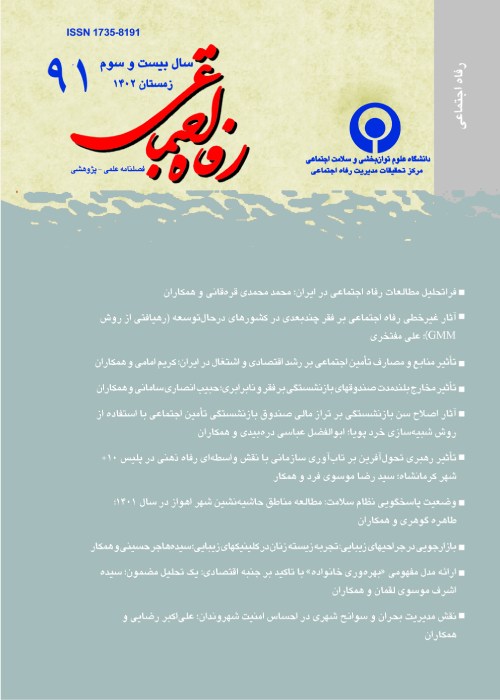Approaches of Islamic Ideology to interfere or not to interfere in the area of divergence
The principles of the School of Natural Rights during the Age of Enlightment, i.e., the 17th and 18th centuries, regarding the individuality of human beings, their freedom and self-determination, as well as the human rights recommendations and documentations are designed and drafted by the international organizations during the current century and the appearance of “Global-ization”, the cultural seeds have been planted in different human societies. Consequently, we have seen (nowadays) that relying on concepts of freedom, intellectualism, natural rights, self-determination, independency, and tendency towards consumerisms; some people have relieved themselves from observing the religious, traditional, and customary values, and have displayed un-conventional styles of life, which is different from the normal and conventional lives of other peo-ple in the society. Using the merits of technology and the appearance of the concept of “Globali-zation”, this culture is being increasingly widespread throughout the world using the platforms, such as the internet, satellites TV, and consumptive goods.
However, this Study is not designed to find the roots of the “divergence” or providing approaches to fight against this global phenomenon. In fact, following the appearance of divergence in the Is-lamic society, this Study is aimed at the identification of Islamic legal system approach(es) and dis-covery of its capacities in order to create a kind of balance in the society and establish social order and justice.
Generally, three different approaches may be provided regarding this phenomenon. The approach based on the obligation that all unconventional behaviors and or lifestyles are rejected and on the strength of the jurisprudential principles and rules, and even some verses of the Holy Quran, such behavior or lifestyles are criminalized. The right-oriented approach accepts the divergence, with some minor exceptions and not only proposes any limitations for it, but also makes no objections against its scope. The final moderate approach is right-task-oriented, and while believing in the freedom of individuals in their lives, criminalizes some of these specific behaviors and lifestyles.
In order to explain and identify the approach of Islamic legal system towards this new social phe-nomenon, the descriptive-analytical and comparative method is used and for the collection of data, the Quranic verses, and Hadith, as well as works authored by Islamic Jurisprudents and western scholars have been utilized.
Critical review of literature:Task-oriented Approach:This approach is based on the “originality of the society”. Verses and jurisprudential rules underlying this approach are aimed at the protection of the society. Originality of the society means that all the behaviors and lifestyles of the individuals are required to be in the framework of tenets, beliefs, and values of the society, and the individuals are required to observe the social val-ue system and any types of theoretical or practical divergence which are in contradiction of the in-dependent identity of the society and the public conscience.
Right-oriented Approach:Contrary to the Task-oriented legal system, which emphasizes the originality of the society and the limitation of the scope of divergence and is established on the “expediency” doctrine, “the Right-oriented legal system” not only believes in the “centrality of the individual”, but also believes in the rights of individuals regarding how to live, how to exist and be free in their behavior and thinking. In this way, there are some jurisprudential and legal rules which form the basis for the school of “centrality of individual.” Some Moslem scholars also believe that not only the centrality is at-tributed to the individual, but also no independent and separate existence may be considered for the society. They believe that the society is a dependent phenomenon and lacks any independent iden-tity. Such scholars think the number of personal beliefs and feelings amounts to the number of people in the society. Among the works of early Islamic philosophers, differences in the souls of human beings may be traced, showing that they recognized differences in the ethics and behaviors of the human beings, which result from the differences in the nature of their souls.
Combined Approach (Right-Task Oriented):Besides these two basic ideologies, there is another ideology in the Islamic World, which thinks of originality not merely for the individual or the society, but for both of them. The legal school based on this ideology, propagates a moderate lifestyle, relying on the expediency for the individu-al and for the society. This belief not only balances the former two approaches, but also believes that the Islamic legal system fundamentally rejects going to the two extremes, because any behavior which is far from balance and moderation, is considered as detachment from pure nature. God has created human beings and their souls to be moderate and to live based on moderation.
All the three approaches regarding the scope of intervention of the criminal law in con-fronting the phenomenon of divergence, lack consensus. The Task-oriented doctrine, which inter-prets the loss principle based on the concept of “expediency”, criminalizes all the behaviors which are in contradiction with the values and beliefs of the society. This approach is aimed at homoge-nization of the thoughts and behaviors, which is inaccessible and will inevitably result in the infla-tion of criminal law and the maximum intervention of the state in the freedom and privacy of the people, as it is traceable in the Iranian legal system. In such a legal system, the punishment is aimed at the public interests and prevention of crimes. Consequently, we witness the increase of preventive crimes and victimless crimes. The criminal policy of such a system shall be based on the security, curbing, and intimidation, which may not be implemented in today’st open and variant world.
The right-oriented legal system, is a system separate from morality, because only the behavior, which threatens or violates the right of other(s) will be criminalized and where the behavior violates the ethics and brings about no harms to others, shall not be considered as a crime. In this system, the state may not intervene in the freedom or privacy of individuals with the justification of expe-diency or the observance of ethics and limit their freedom based on the patrimonial reasons and the rules of morality. In other words, in such a system, the state is designed to be based on the princi-ples of minimalism and minimum intervention. Although this legal system, based on the principle of tolerance, and taking the criminal policies based on the tolerance, is in line with today’s plural society, and tolerates individuals with all types of clothing, tendencie,s and lifestyles, is somehow approving the human rights and the freedom of thoughts and expressions, and although the princi-ple of tolerance is considered in Islam as an ethical value, this principle may create a justification for some people to promote anarchistic and pure permissiveness. Moreover, recognizing the prin-ciple of “tolerance” in this legal school may be considered as the approval of the divergence and denial of “homogenous lifestyle”. This level of tolerance is not a good characteristic in the way defined in the Holy Quran and is not considered as an ethical value. Actually, it is one of the liber-alist principles, which may not be contested, and any thought or act, which attempts to limit the scope of tolerance and permissiveness must be limited. Consequently, the tolerance which is one of the principles of this school is in line with the religion of Islam, if it agrees with the ethical prin-ciples. Otherwise, it will be turned into a theory of trait.
But in the combined legal system, which is based on the “legal expediency”, the criticizing and public contempt of a behavior may not be considered as a good reason for calling it an unethical behavior. On the other hand, the gladiator-like behaviors, which are aimed at the entertainment or enjoyment of the individual or people who do it, are not acceptable.
If the legal system is merely task-oriented, some type of ethical populism is formed and a unique lifestyle is inflicted upon the society. If the legal system is merely right-oriented, then the permis-siveness and unstrained tendencies are promoted. Consequently, in the combined or moderate sys-tem, taking into account the expediency of the society and the rights of individuals and with the designing of a “moderate state”, any the type of behavior which is rationally and naturally consid-ered as unethical, and each behavior which is prohibited in the religion, such as divergence, shall be forbidden. However, other representations of the divergence which appear in the form of clothing, make-up, viewpoints, etc., are not considered as unethical and if no religious rule have been issued to prohibit them, they will be authorized. In fact, this approach is a type of liberalism combined with the governing perfectionism. The aforementioned approach follows some of the principles of liberalism, such as freedom, self-determination, and independency and at the same time supports the behaviors, which promotes the human being to the rank of “divine closeness”.
Funding
In the present study, did not have any sponsors
Authors’ contributions
All authors contributed in designing, running, and writing all parts of the research.
Conflicts of interest
This article does not conflict with other articles of my.
Acknowledgments
In this article, all rights relating to references are cited and resources are carefully listed.
- حق عضویت دریافتی صرف حمایت از نشریات عضو و نگهداری، تکمیل و توسعه مگیران میشود.
- پرداخت حق اشتراک و دانلود مقالات اجازه بازنشر آن در سایر رسانههای چاپی و دیجیتال را به کاربر نمیدهد.



